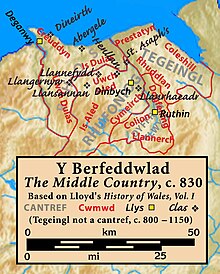Tegeingl

Tegeingl, also known as Englefield,[1] was a cantref in north-east Wales during the mediaeval period. It was incorporated into Flintshire following Edward I of England's conquest of northern Wales in the 13th century.
Etymology
[edit]The region's name was derived from the Deceangli, an Iron Age Celtic tribe which had inhabited the region and attested since the 1st century BC.
Location
[edit]The cantref formed the eastern part of Perfeddwlad (or Y Berfeddwlad) on the northern coast of Wales between the River Clwyd and Deeside. The territory is roughly equivalent to the modern county of Flintshire today.
History
[edit]Comprising the three commotes of Rhuddlan, Prestatyn and Coleshill (Cwnsyllt),[2] the territory originally formed part of the Kingdom of Gwynedd until, in the late 8th century, it was conquered by the Anglo-Saxon Kingdom of Mercia. It remained under Mercian (or English) control for over three centuries until Dafydd ab Owain Gwynedd recovered it in the 12th century.[2] Edwin of Tegeingl (d.1073) was in the 11th century described as "lord" or "prince" of Tegeingl.[2] He was succeeded as lord of Tegeingl by his son Owain who supported the Anglo-Normans' invasion of North Wales in the 1090s.[3] The family remained powerful in North Wales until Owain's sons were killed in 1125 by a son of Gruffudd ap Cynan, Prince of Gwynedd.[4]
It then changed hands several times between England and Gwynedd,[5] but was eventually seized by Edward I as part of his conquest of the Principality of Wales between 1277 and 1283. It was then incorporated into the county of Flintshire by the Statute of Rhuddlan.[6]
References
[edit]- ^ R R Davies (2000). The Age of Conquest: Wales 1063-1415: Vol 2. Oxford University Press. p. 12. ISBN 978-0198208785.
- ^ a b c Davies, William Llewelyn. "Edwin of Tegeingl". Dictionary of Welsh Biography. National Library of Wales. Retrieved 15 December 2012.
- ^ Pierce, Thomas Jones. "Owain ab Edwin". Dictionary of Welsh Biography. National Library of Wales. Retrieved 15 December 2012.
- ^ Wilcott, Darrell "The Ancestry of Edwin of Tegeingl"
- ^ David Walker (1990). Medieval Wales. Cambridge University Press. p. 25. ISBN 978-0521311533.
- ^ J. Graham Jones (January 1990). The history of Wales: a pocket guide. University of Wales Press. p. 32. ISBN 978-0-7083-1076-2. Retrieved 2 March 2011.
